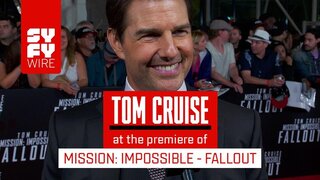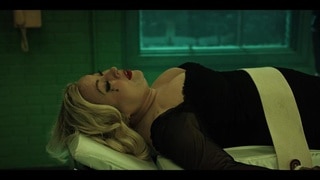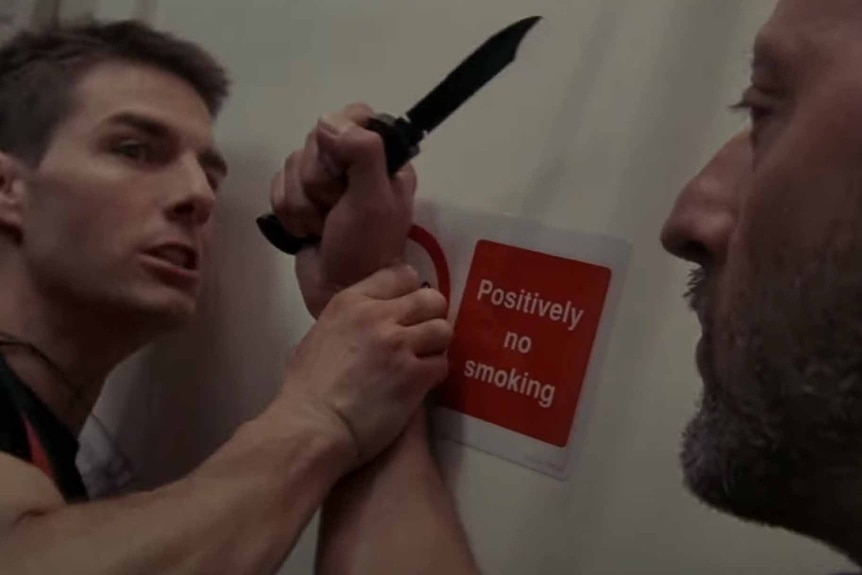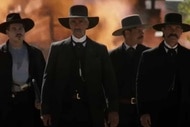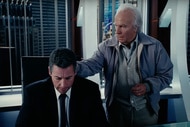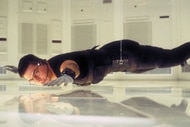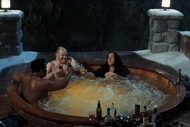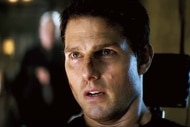Create a free profile to get unlimited access to exclusive videos, sweepstakes, and more!
Why The First Mission: Impossible Movie Still Holds Up
It's more subdued than its sequels, but the first Mission: Impossible movie still packs plenty of thrills.
Today, the Mission: Impossible films are things we go to for death-defying, incredibly ambitious stunt-work and a sense of scale that dwarfs other action films. Star and producer Tom Cruise has turned the franchise, which he's now led for almost three decades, into a showcase for that kind of filmmaking, and that means the franchise sequels continue to dazzle audiences around the world.
But it wasn't always that way, and if your introduction to the series is one of the sequels, you might be a little thrown by looking back at 1996's Mission: Impossible, the film that started it all for Cruise and his team. Yes, there's action there, and plenty of the other hallmarks that have made the franchise into a spy movie staple, but there's something altogether more intimate about this first go 'round for Cruise's Ethan Hunt. It's more spy movie than action caper, more about tension than all-out thrills, and that might make it stand out as different to some fans.
Look closer at the first Mission: Impossible movie, though, and you'll find a deeply entertaining, beautifully executed foundation for the franchise to come, a film that still holds up after almost 30 years and half a dozen sequels.
For More on Mission: Impossible:
Mission: Impossible Movies, Ranked
Why You Should Give Mission: Impossible III Another Chance
Oops! Tom Cruise apologized to couple after interrupting their hike with 'Mission Impossible' stunt
Why Tom Cruise's First Mission: Impossible Movie Stands Out from the Rest of the Franchise
The plot, which builds off the franchise's TV show roots and makes an effort to throw the audience off right away, is something that's since become quite familiar to spy movie fans everywhere, even if the only other spy movies you've watched are under the Mission: Impossible umbrella. At stake in the story is a secret list of undercover agents around the world, agents who would be in grave danger if that list ever fell into the wrong hands. To make things juicier, Ethan Hunt (Tom Cruise) is framed as the person responsible for trying to steal the list and compromise his own agency, the IMF (Impossible Mission Force), yet another hallmark of the series. To clear his name and save the world, Ethan has to essentially go rogue, fighting against people he once called allies to get to the heart of a vast conspiracy.
This all starts, of course, with a betrayal on a grand scale, as Hunt watches in horror while his team is picked off one by one when a mission in Europe goes horribly wrong. At the time, it was something that was intended to throw off fans of the original TV show, surprising the audience and giving an indication that this wasn't your father's Mission: Impossible. It's a bold move, and while other action directors have arguably made bigger marks on the franchise since, there was probably no one better to pull it off in 1996 than Brian De Palma.
Best known among genre fans for films like Carrie and Phantom of the Paradise, De Palma is also one of cinema's greatest heirs to the thriller legacy of Alfred Hitchcock. Through films like Blow Out (one of the finest thrillers of the 1970s), Dressed to Kill, and Raising Cain, De Palma created a reputation as a purveyor of not only thick, delicious tension, but the kind of stories that continually upset viewer expectations and keep us guessing from moment to moment. There's a paranoid hyperreality to his thrillers, particularly in stuff like Blow Out, that made him perfect for a film that starts with a baseline of betrayal and lack of trust, and he milks it for all its worth in this film.
But of course, De Palma is known for more than just tone. He's also a visual stylist with his own distinct flair, and all these years later, the first Mission film still looks very much like a Brian De Palma joint. He coats the screen in cool reds and blues, playing up the film's themes and tensions with color, before strikingly going with stark white-on-black designs for the famous sequence in which Cruise is suspended over a secure CIA room, trying to get information while never compromising the security measures. He adds dynamism to the film even when the action scenes have slowed down with sleek, wonderfully timed camera moves, and he even uses a moving elevator to capture the split-screen effect that's been a hallmark of so many of his films. Cruise is unmistakably the biggest name present in every movie in this franchise, but De Palma left his mark, and it's wonderful to see that mark at the core of a franchise that went so much bigger after this first installment.
Of course, none of it works without Cruise, and while he's certainly applied more mythmaking and intensity to Ethan Hunt in the years since the first film, there's already a clear case of a character being built before our eyes with this one. De Palma's camera, and the patience of the script by David Koepp and Robert Towne, give space for Cruise to map the intense life behind Hunt's eyes as he fights to clear his name, to make sure his team didn't die in vain, and to protect the family members who've been jeopardized by the scheme to make him a patsy. Some detractors of this franchise will argue that Cruise's character is a bit too much of a cipher to really care about, and that he's since just become a vehicle for increasingly deranged stunts, but there's always been biting, vital life to Ethan Hunt, and it shows particularly well in this film.
It might have been a while since you've seen or even thought about the first Mission: Impossible film, and you might be surprised by the restraint (apart from the film's climactic chase) that you see here upon revisiting it. But different though it may be from the films that followed, this is still a spy movie gem, a film packed with remarkable tension, and a showcase for both director and star. In short, it holds up, and it's still a joy to watch.
Mission: Impossible is now streaming on Peacock.
